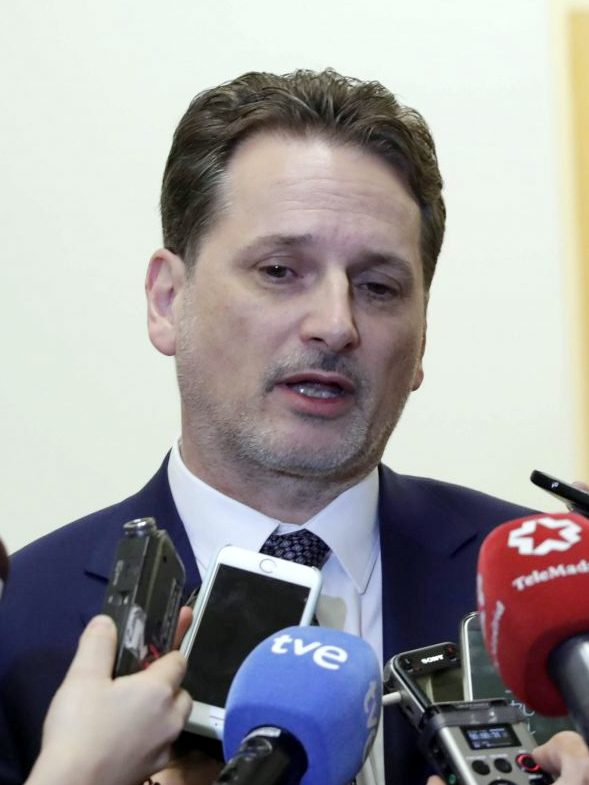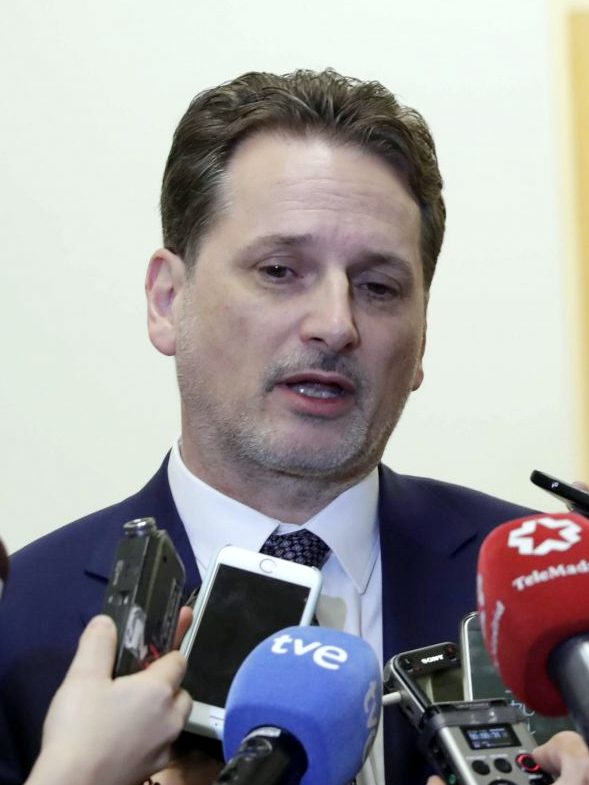
UNRWA Chief to Hamas: “We are united, and no one can separate us”
A significant revelation came through documents released by UN Watch detailing secret meetings between the former Commissioner-General of The United Nations Relief and Works Agency for Palestine Refugees (UNRWA), Pierre Krähenbühl, and various Palestinian terrorist group leaders in Lebanon in 2017. These meetings provide insight into what appears to be institutional-level connections between UNRWA and terrorist organizations.
The February 2017 meeting in Beirut brought together an alarming array of participants. In attendance were Pierre Krähenbühl, then UNRWA Commissioner-General, alongside Hakam Shawan, UNRWA Chief in Lebanon. They met with Ali Baraka representing Hamas, Abu Imad Al-Rifai from Islamic Jihad (PIJ), and Salah Al-Youssef from the PFLP, among other Palestinian terror group representatives.

Pierre Krähenbühl (By Diario de Madrid via Wikipedia)
During these meetings, Krähenbühl made several troubling statements that suggested deep cooperation with terror organizations. He emphasized what he called a “spirit of partnership” between UNRWA and the terror organizations, offering to meet “a thousand times” to discuss their concerns. Perhaps most concerningly, he suggested UNRWA decisions could be “changed” or “torn up” at their request. His explicit statement that “We are united, and no one can separate us” further underscored the depth of this relationship. Notably, he requested secrecy about the meetings, acknowledging they could “challenge our credibility” with donor nations.
Krähenbühl’s Full Speech to the Terrorist Leaders
“We will not abandon the role entrusted to us, to be the historical witness to the injustice that has befallen the Palestinian people…
“Regarding the principle of partnership you mentioned, and the necessity of being proactive so that we remain cooperative and not caught off guard, I completely agree with you and strongly support this perspective. I also have a request: that the spirit of partnership be mutual.
“In other words, if you have any criticisms, observations, concerns, or issues you are dissatisfied with regarding UNRWA, let us come back and meet in similar gatherings—even if we meet a thousand times. Challenge our decisions, tell us, “We do not agree with this decision, and we criticize it.” We might change it or even entirely tear it up.
“But we want the spirit of partnership to prevail in our meetings.
“We also prefer these discussions not to be public, as that could challenge our credibility. More importantly, it could lead to a loss of trust between donor countries and UNRWA, which might result in reduced or even halted funding.
“Your cooperation with us in security matters and your commitment to not closing UNRWA institutions, facilities, schools, or offices also completes this partnership.
“If we can achieve this, it means we are united, and no one can separate us.”
Meeting Participants and Their Histories
The backgrounds of the meeting’s attendees raise additional red flags. Ali Baraka, the Hamas official present, maintained close ties to terrorist entities in Syria and Iran and was listed by the U.S. as a wanted terrorist. Abu Imad al-Rifai, the PIJ leader in attendance, had previously boasted about organizing suicide bombings targeting U.S. and British military personnel.
The IRC Connection and Current Controversy
The story takes on additional significance given Krähenbühl’s current role as Director General of the International Committee of the Red Cross (ICRC), which he assumed in December 2023. Under his leadership, the ICRC has faced severe criticism regarding its handling of the Israeli hostages held in Gaza since October 7.
The ICRC has been accused of failing to fulfill its humanitarian mandate regarding the hostages. Israel has particularly criticized the organization for refusing to attempt delivery of medicines provided by hostages’ families. While the ICRC did agree to transport freed hostages during the exchange deal, this limited involvement led to criticism from hostage families, with one family member describing the ICRC as merely a “glorified Uber service.”
This pattern of behavior raises questions about whether Krähenbühl’s previous relationships with Hamas and other terror organizations might influence the ICRC’s current operations and decision-making processes. The organization’s apparent inability or unwillingness to secure access to hostages, deliver essential medicines, or provide meaningful assistance beyond transport during prisoner exchanges has drawn intense scrutiny.
Institutional Implications
These revelations raise serious questions about both UNRWA’s and the ICRC’s institutional independence and the effectiveness of their oversight mechanisms. They point to potential misuse of humanitarian resources and cast doubt on these organizations’ ability to maintain neutrality in conflict zones.
The documents suggest that rather than these being isolated incidents of individual staff members acting independently, there may have been a more systematic pattern of cooperation between humanitarian leadership and terrorist organizations. This raises fundamental questions about both organizations’ operations and future.
Israel has provided evidence that UNRWA workers committed such atrocities as murder, hostage-taking and even kidnapping the bodies of the dead and wounded. On September 26, UNRWA announced that they had terminated the contracts of a dozen employees who were accused of being involved in the massacre, promising that they would hold them accountable even through “criminal prosecution.”
The U.N. Oversight Investigations Division confirmed that compelling evidence was presented against at least nine UNRWA workers, but no legal proceedings are pending against them. Israel claims many more UNRWA employees were complicit in the massacre.
After its incursion into Gaza, the IDF discovered terror tunnels underneath UNRWA headquarters. The lawsuit claims that UNRWA officials reasonably should have foreseen that their facilities would be used to attack Israel. Before the war, UNRWA was the largest employer in Gaza, employing an estimated 14,000 Gazans. It was estimated that 10% of UNRWA’s Gaza staff are active Hamas terrorists.
UNRWA faced international scrutiny in January 2024 when sixteen countries suspended funding to UNRWA, including Australia, Canada, France, Germany, Japan, the United Kingdom and the United States following allegations that approximately twelve UNRWA employees participated in the October 7 attacks. Newly revealed documents suggest these connections between UNRWA and terrorist organizations may represent a longer-standing pattern rather than isolated incidents. Most of these countries have restored this funding. The U.S. State Department announced that it wants to restore funding despite a U.S. law that prevents it from doing so until March 2025.
Current Impact and Future Concerns
The connection between UNRWA’s past compromised leadership and the current ICRC’s apparent limitations in addressing the hostage crisis presents a troubling pattern in humanitarian operations. The exposure of these historical connections between humanitarian leadership and terror organizations demands a thorough reevaluation of how international humanitarian organizations operate in complex conflict zones.
The pattern of institutional-level connections, now documented through multiple sources and time periods, suggests the need for comprehensive reform and enhanced oversight mechanisms across major humanitarian organizations. The fact that an individual who previously facilitated secret meetings with terror organizations now leads another major humanitarian organization raises serious questions about the vetting and appointment processes for leadership positions in international humanitarian organizations.
This convergence of controversies surrounding both UNRWA and the ICRC under connected leadership highlights the urgent need for greater transparency, accountability, and potentially reformed governance structures in international humanitarian organizations operating in conflict zones.
The post UNRWA Chief to Hamas: “We are united, and no one can separate us” appeared first on Israel365 News.
Israel in the News